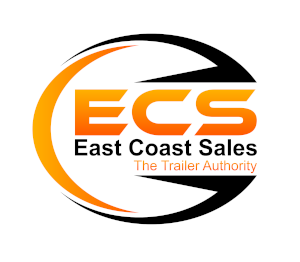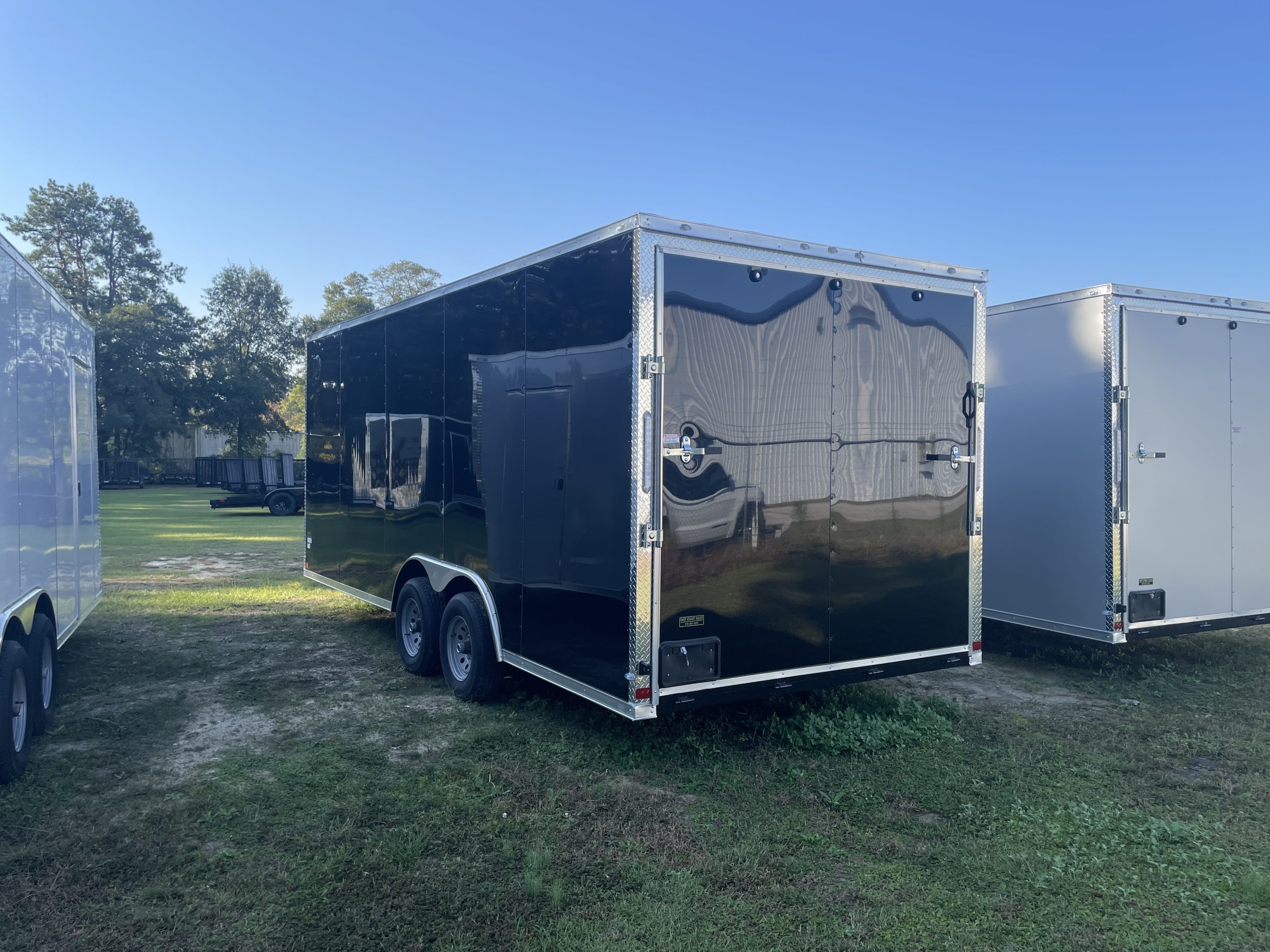Different types of trailers in Raleigh North Carolina
In Raleigh, North Carolina, there are several different types of trailers available for purchase, each designed for specific purposes and hauling needs. Whether you’re transporting goods, vehicles, equipment, or recreational items, selecting the right trailer is crucial for both safety and efficiency. Below is a breakdown of the different types of trailers commonly found in Raleigh, NC, along with their typical uses.
- Utility Trailers
Best for: General-purpose hauling, landscaping, small equipment, or personal use.
Description:
Utility trailers are the most common type for homeowners and small businesses. They are typically open (without sides or with removable sides) and come in various sizes and weight capacities. Utility trailers are used for transporting items such as furniture, debris, landscaping equipment, and even small vehicles.
Key Features:
- Size: Common sizes range from 4′ x 6′ to 7′ x 16′.
- Weight Capacity: Typically 1,500 lbs to 7,000 lbs, depending on the size and axle configuration.
- Options: Some have fold-down sides, ramps for loading, and single or tandem axles.
Ideal For:
- Moving household goods.
- Lawn care equipment.
- Small vehicles or ATVs.
- Construction debris or other loose materials.
- Enclosed Trailers
Best for: Hauling valuable items, weather-sensitive cargo, or for secure storage.
Description:
Enclosed trailers offer full protection for cargo with sides, a roof, and a door, often with locking mechanisms for security. These are ideal for transporting motorcycles, classic cars, tools, or anything that needs protection from the elements or theft. They are also useful for businesses needing mobile storage or transporting items in a more organized manner.
Key Features:
- Size: Common sizes range from 6′ x 12′ to 8′ x 24′ or larger.
- Weight Capacity: Can vary from 3,000 lbs to 10,000 lbs or more.
- Security Features: Locking doors, interior shelving or tie-downs.
- Climate Protection: Ideal for protecting cargo from rain, snow, dust, and theft.
Ideal For:
- Hauling motorcycles, classic cars, or recreational vehicles.
- Mobile businesses like food trucks or vendors.
- Transporting fragile or expensive equipment.
- Moving household goods that require weather protection.
- Car Hauler Trailers
Best for: Transporting cars, trucks, and other vehicles.
Description:
Car hauler trailers are specifically designed to transport vehicles safely. They typically come with flatbeds, low decks, or tilt designs for easy loading. They can either be open (exposed to the elements) or enclosed (providing protection for the car being hauled). Open car haulers are more common, but enclosed versions are used for high-value or classic vehicles.
Key Features:
- Size: Typically 7′ x 14′ to 8′ x 24′.
- Weight Capacity: Ranges from 3,000 lbs to 14,000 lbs, depending on the size.
- Tie-Down Points: Designed with secure tie-down points to anchor vehicles during transport.
- Ramp Options: Many car haulers include a loading ramp for easy access.
Ideal For:
- Car dealerships or auto transporters.
- Individuals who need to transport multiple vehicles.
- People who need to haul a non-running vehicle.
- Dump Trailers
Best for: Hauling and unloading loose materials, such as dirt, gravel, or debris.
Description:
Dump trailers have a hydraulic lift system that allows the bed of the trailer to tilt, making unloading materials like dirt, rocks, sand, or construction debris much easier. These trailers are highly efficient for landscaping projects, construction sites, or any job that involves hauling and dumping loose materials.
Key Features:
- Size: Common sizes are 6′ x 10′ to 8′ x 16′.
- Weight Capacity: 3,000 lbs to 10,000 lbs.
- Hydraulic Lift: Makes unloading heavy or bulky materials easy.
- Durability: Typically built with reinforced steel frames to withstand heavy-duty use.
Ideal For:
- Landscaping projects.
- Construction site waste removal.
- Moving bulk materials like gravel, sand, or mulch.
- Flatbed Trailers
Best for: Hauling large, heavy, or oversized loads.
Description:
Flatbed trailers are open trailers without sides or a roof, making them versatile for transporting large or odd-shaped loads that may not fit in an enclosed trailer. These trailers are commonly used in construction, agriculture, and for moving heavy machinery, equipment, or building materials.
Key Features:
- Size: Common sizes range from 7′ x 14′ to 8′ x 20′ or longer.
- Weight Capacity: Can range from 5,000 lbs to over 20,000 lbs, depending on the trailer.
- Tie-Down Points: Includes D-rings or E-track systems to secure cargo.
Ideal For:
- Heavy machinery or equipment transport.
- Construction materials like lumber, steel, or bricks.
- Oversized or irregularly shaped loads that need to be strapped down securely.
- ATV/UTV Trailers
Best for: Hauling ATVs, UTVs, dirt bikes, or other recreational vehicles.
Description:
These trailers are specifically designed to haul smaller, recreational vehicles like ATVs, dirt bikes, or side-by-side UTVs (Utility Task Vehicles). They often feature ramp systems for easy loading and unloading, as well as low-clearance designs to make it easier to load vehicles with low ground clearance.
Key Features:
- Size: Typically range from 5′ x 8′ to 7′ x 14′.
- Weight Capacity: Typically around 2,000 lbs to 3,500 lbs.
- Ramp Options: Foldable ramps or tilting decks for easy loading.
- Tie-Down Points: To secure the recreational vehicle during transport.
Ideal For:
- Hauling ATVs, UTVs, motorcycles, or dirt bikes.
- Recreational vehicle enthusiasts.
- Farmers or ranchers moving equipment or small vehicles.
- Boat Trailers
Best for: Transporting boats, jet skis, or other watercraft.
Description:
Boat trailers are designed to carry boats or jet skis safely. They come in a range of sizes, depending on the type and size of the boat. Boat trailers typically feature rollers or bunks that provide a stable platform to load, unload, and support the boat.
Key Features:
- Size: Varies by boat size, but typically around 8′ x 16′ to 8′ x 24′.
- Weight Capacity: Typically ranges from 2,000 lbs to 10,000 lbs or more.
- Roller or Bunk Systems: For easy loading and unloading of boats.
- Weather Resistance: Some trailers feature galvanized steel to resist rust from exposure to water.
Ideal For:
- Hauling small to large boats, jet skis, and other watercraft.
- Boating enthusiasts who need to transport their vessels between lakes, rivers, and marinas.
- Refrigerated Trailers (Reefer Trailers)
Best for: Transporting temperature-sensitive goods.
Description:
Refrigerated trailers, or reefer trailers, are equipped with cooling systems to maintain a specific temperature for cargo. These trailers are ideal for transporting food, pharmaceuticals, or any goods that require temperature control.
Key Features:
- Size: Typically 8′ x 16′ to 8′ x 24′.
- Temperature Control: Built-in cooling system to maintain a desired temperature.
- Insulation: Provides insulation to maintain the internal temperature, even in varying external conditions.
Ideal For:
- Transporting perishable food items.
- Pharmaceuticals or medical supplies that require specific temperatures.
- Any business needing temperature-controlled storage for transport.
- Gooseneck Trailers
Best for: Hauling heavy or oversized loads.
Description:
A gooseneck trailer is a type of flatbed trailer that uses a gooseneck hitch, which is mounted in the bed of a pickup truck. Gooseneck trailers are often used for transporting heavy-duty loads, including vehicles, construction equipment, and livestock.
Key Features:
- Size: Usually ranges from 7′ x 20′ to 8′ x 40′ or longer.
- Weight Capacity: Can support 10,000 lbs to 30,000 lbs or more.
- Gooseneck Hitch: Provides better weight distribution and towing stability.
Ideal For:
- Heavy-duty equipment transport.
- Moving large livestock or construction machinery.
- Large vehicles or trailers with a heavy payload.
- Livestock Trailers
Best for: Transporting livestock (cattle, horses, pigs, etc.).
Description:
Livestock trailers are designed with ventilation and ample space for the comfortable transportation of animals. These trailers usually have low, sturdy floors, partitions for separating animals, and a ramp for easy loading.
Key Features:
- Size: Typically ranges from 6′ x 12′ to 8′ x 24′.
- Weight Capacity: Typically between 3,000 lbs and 10,000 lbs.
- Ventilation: Equipped with ample ventilation to ensure the comfort of animals.
Ideal For:
- Farmers and ranchers transporting livestock.
- Horse owners moving animals for shows or events.
- Agricultural businesses requiring transport of animals.
Conclusion:
When choosing a trailer in Raleigh, NC, it’s essential to consider the specific purpose for which you need the trailer. Whether you need a utility trailer for everyday use, a car hauler for vehicle transport, a dump trailer for hauling loose materials, or a livestock trailer for moving animals, understanding your needs will help you select the right type of trailer for your situation. Make sure to choose a trailer that meets your weight capacity requirements, is compatible with your towing vehicle, and provides the features that are important for your specific use case.
Top of Form
Bottom of Form
When you need the very best trailer and only want 5 star customer service come visit us at East Coast Trailer Sales. We are the triangle’s premier trail sales specialist. We can help you select the perfect trailer for your needs and get you on the road quickly. To learn more visit us online at https://www.eastcoastsales.com/ or check out our social media at https://www.facebook.com/eastcoastsalesraleigh . To browse our inventory, please visit https://www.eastcoastsales.com/inventory/ .
To speak to an expert call us at (919) 661-1045 today.
Different types of trailers in Raleigh North Carolina

